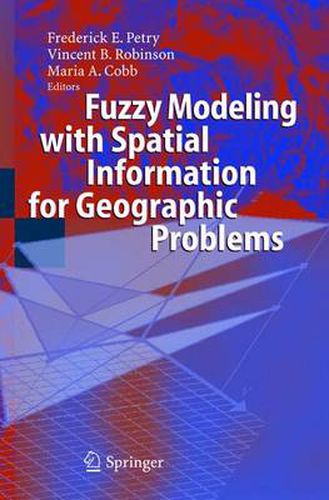Readings Newsletter
Become a Readings Member to make your shopping experience even easier.
Sign in or sign up for free!
You’re not far away from qualifying for FREE standard shipping within Australia
You’ve qualified for FREE standard shipping within Australia
The cart is loading…






This title is printed to order. This book may have been self-published. If so, we cannot guarantee the quality of the content. In the main most books will have gone through the editing process however some may not. We therefore suggest that you be aware of this before ordering this book. If in doubt check either the author or publisher’s details as we are unable to accept any returns unless they are faulty. Please contact us if you have any questions.
This book focuses on research advances in approaches for incorporating explicit handling of uncertainty, especially by fuzzy sets, to address geographic problems. Over the past several years interest in the use of fuzzy sets approaches has grown across a broad spectrum of fields that use spatial information to address geographic problems. Not only has there been considerable research on incorporating fuzzy sets in the geographic information systems (GIS) supporting geographic problem solving, but increasingly the uncertainties inherent in modeling geographic problems have been addressed using soft computing methods. This book has two aims. One is to stimulate further research in both the theory and application of fuzzy sets to spatial information management and geographic problem solving. The other is to highlight the advances in research which have matured to the point that we find fuzzy modeling being used by geoscientists, computer scientists, geographers, ecologists, engineers, and others. The book includes examples of the use of fuzzy sets in representational issues such as terrain features, landscape morphology, spatial extents and approaches for spatial interpolation. A variety of applications using fuzzy sets are covered including data mining, spatial decision making, ecological simulation, and reliability in GIS.
$9.00 standard shipping within Australia
FREE standard shipping within Australia for orders over $100.00
Express & International shipping calculated at checkout
This title is printed to order. This book may have been self-published. If so, we cannot guarantee the quality of the content. In the main most books will have gone through the editing process however some may not. We therefore suggest that you be aware of this before ordering this book. If in doubt check either the author or publisher’s details as we are unable to accept any returns unless they are faulty. Please contact us if you have any questions.
This book focuses on research advances in approaches for incorporating explicit handling of uncertainty, especially by fuzzy sets, to address geographic problems. Over the past several years interest in the use of fuzzy sets approaches has grown across a broad spectrum of fields that use spatial information to address geographic problems. Not only has there been considerable research on incorporating fuzzy sets in the geographic information systems (GIS) supporting geographic problem solving, but increasingly the uncertainties inherent in modeling geographic problems have been addressed using soft computing methods. This book has two aims. One is to stimulate further research in both the theory and application of fuzzy sets to spatial information management and geographic problem solving. The other is to highlight the advances in research which have matured to the point that we find fuzzy modeling being used by geoscientists, computer scientists, geographers, ecologists, engineers, and others. The book includes examples of the use of fuzzy sets in representational issues such as terrain features, landscape morphology, spatial extents and approaches for spatial interpolation. A variety of applications using fuzzy sets are covered including data mining, spatial decision making, ecological simulation, and reliability in GIS.